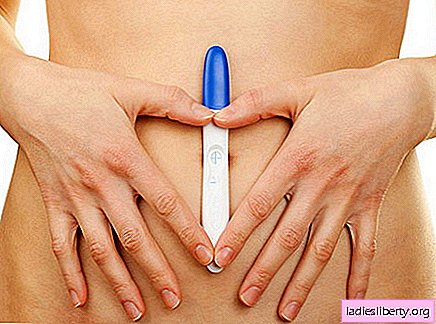
Are there periods during pregnancy?
According to medical statistics, every fifth woman faces such a problem as menstruation during pregnancy. Before giving an answer to the question whether this phenomenon is dangerous for pregnancy or you can treat it calmly, you should understand its nature. The fact is that the inner walls of the uterus are covered with a mucous membrane - endometrium, covered with numerous vessels, ensuring its good blood supply. The endometrium is very sensitive to the monthly cycle and processes occurring in the ovaries. The reason for this sensitivity is female sex hormones. For example, when the follicle increases, estrogen is released, which causes an increase in the size of the uterine lining. During ovulation, instead of a follicle, a yellow body forms, which is associated with another female hormone - progesterone.
Accumulating beneficial substances in the endometrium, progesterone prepares it for the adoption of a fertilized egg. If conception does not occur, after about a couple of weeks the work of the corpus luteum, and hence the production of progesterone, stops. A decrease in the amount of progesterone leads to atrophy and stratification of the endometrium, which at the same time exposes and injures the vessels. This is how menstrual blood is formed from blood, mucus and fragments of dead endometrium. If conception occurs, then the activity of the corpus luteum persists for almost 3 months, and the production of progesterone continues, which at this time ensures the preservation of pregnancy. The appearance of menstruation in such conditions should be considered as evidence of endometrial rejection, and, therefore, miscarriage. Therefore, menstruation during pregnancy should not be considered as regular menstruation, but as a bleeding of a different nature, which the doctor should find out.
When menstruation during pregnancy is not dangerous
That is why, having discovered bloody discharge from the vagina, the expectant mother, regardless of the gestational age, should inform her doctor about them, even if her already giving birth girlfriends or other sources will tell her that menstruation during pregnancy is not a reason for unrest. Of course, there are women who had spotting during pregnancy, and they safely endured and gave birth to healthy babies. Doctors explain such “safe” bleeding as a result of the penetration (implantation) of an egg into the mucous membrane, or the formation of a vascular network in the membranes of the embryo. It is believed that implantation bleeding is not a potential threat to the development of pregnancy. Although you need to remember that in his case the bleeding looks like just a few drops of blood on the expectant mother’s underwear, and it happens very rarely.
Menstruation during pregnancy is an alarming symptom.
Most doctors insist that spotting or blood flow in a pregnant woman should be considered a clear sign of an imminent threat of miscarriage and require close attention. This is especially true of the first trimester of pregnancy. There is evidence that up to 80% of all miscarriages occur in the first 12 weeks of pregnancy, most often on the days when a woman should have started her menstruation. Although, on the other hand, experts believe that menstruation during pregnancy in the first month is quite possible, due to the fact that the hormonal background of a woman simply did not have time to change. Such periods are always insignificant and painless. But in the second month this should no longer be.
In any case, treating bloody secretions during pregnancy is not frivolous, since they can indicate inflammatory or infectious diseases of the internal genital organs, hormonal disorders, internal injuries, placenta dissection, various pathologies of the fetal development (for example, detachment of the fetal egg), and . d.
Any of these conditions can be dangerous to the health of the mother or baby. For example, in case of violation of progesterone production, as we have already said, fetal uterine rejection may occur. Turning to the doctor in a timely manner, the mother will begin to receive progesterone replacement drugs that will help stop the threat of miscarriage and allow her to calmly bear the baby.
Another hormonal disorder leading to the appearance of bloody discharge is hyperandrogenism, which consists in an excess of male hormones. This violation can cause detachment of the fetal egg and subsequent miscarriage.
Another dangerous condition that menstruation can talk about during pregnancy is an ectopic pregnancy, when the fetus develops outside the uterine cavity. You can recognize ectopic pregnancy by severe pain, which is accompanied by vaginal bleeding and over time become longer. To confirm or refute the diagnosis of ectopic pregnancy, a woman should immediately consult a doctor to conduct the necessary studies.
It happens that menstruation during pregnancy indicates an unsuccessful attachment of the fetus. This occurs if the expectant mother has endometriosis or fibroids. In this case, problems arise with the development of the embryo and its supply with oxygen, which can also result in a miscarriage.
At later dates, usually at 28-32 weeks (in some cases at 16-28 weeks), bleeding can signal placenta previa, that is, a condition where the placenta blocks the entrance to the cervix due to its too low location. The risk group for this complication includes women who have had an abortion or whose previous birth ended with a caesarean section.
Menstruation during pregnancy in very rare cases occurs due to this phenomenon: first, a multiple pregnancy occurs, that is, two embryos develop in the uterus. Moreover, the development of one proceeds normally, and the woman’s body rejects the second organism of the woman for those other reasons. Then the appearance of bleeding indicates a miscarriage.
Menstruation during pregnancy: it is better to consult a doctor
Obviously, the reasons why menstruation may appear during pregnancy can be different and, as a rule, not harmless. Therefore, the expectant mother, even if with the appearance of spotting, she feels well and does not feel pain, should consult a doctor. If such discharge is accompanied by back pain or cramping abdominal pain, you should immediately call an ambulance, because in this case, the result of an independent trip to the clinic may be a miscarriage.
Very often, especially if the bleeding is associated with hormonal disorders, doctors in a hospital can prevent a miscarriage with the help of hormonal and hemostatic drugs. If it is not possible to save the pregnancy, the timely intervention of doctors helps to minimize problems associated with miscarriage and gives the woman hope that her next pregnancy will be successful.
The body of any woman very individually responds to changes that occur with him during pregnancy. Therefore, every expectant mother to reduce the risk of any problems, including menstruation during pregnancy, must observe the regimen of the day and diet, avoid unacceptable physical exertion and follow all the recommendations of her doctor, and in case of bleeding, be sure to contact him for advice .
Comments
I don’t know how people see it from the first week and put it on preservation, I’m kind of from the city but the medicine is very backward or just the doctors have such an attitude (











